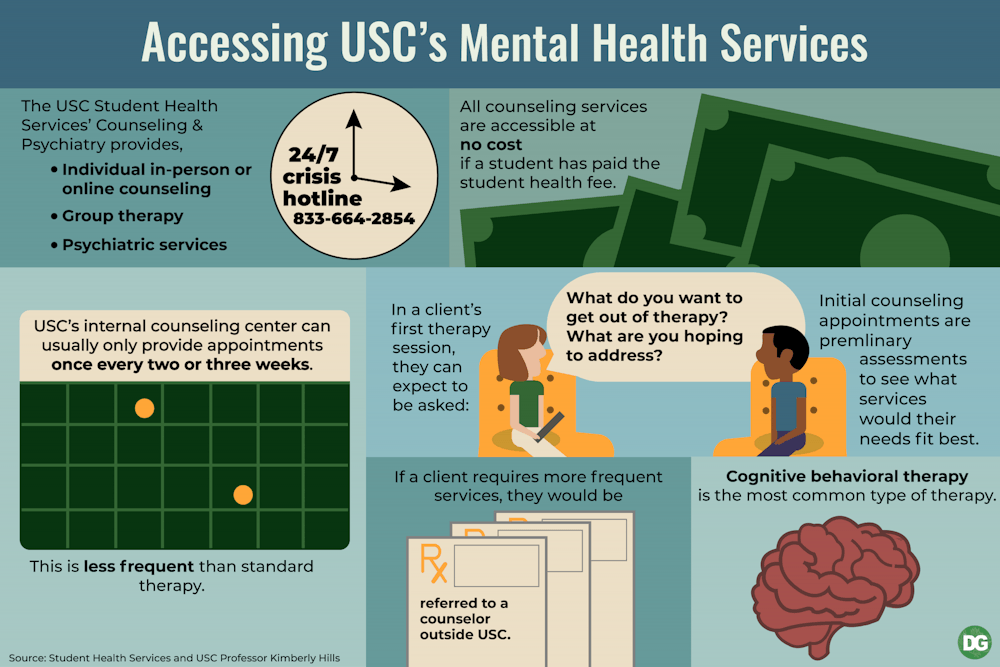USC's Student Health Services offers individual in-person or online counseling, group therapy and psychiatric services but said its programs will not meet every student's needs.
All services are free through the student health fee, which is automatically added to students' tuition if they're registered for more than six credit hours. At least six counseling sessions are offered through Thrive@Carolina, an online wellness hub that connects students with virtual and in-person options through a partnership with Christie Campus Heath. While students start with six sessions, they are able to add additional sessions if requested.
Dr. Elizabeth-Clare Porter, the director of counseling and psychiatry at USC, said students should seek help if their mental health prevents them from doing things they need or like to do.
"'I can't do this thing that I used to love to do, or I'm failing my classes, because I feel so sad or because I feel so anxious,'" Porter said. "And that's when it is something that you might want to consider reaching out to get some help for."
If a student decides to seek help, they will set up a triage appointment, or a preliminary assessment, to determine what services would fit best — whether it be group therapy, individual counseling or another type of appointment. Appointments are arranged online or over the phone, and these appointments generally have a wait time of around three weeks. Students can also set up a walk-in appointment for more immediate service.
"When you meet with the triage counselor for that visit, they will listen to everything that's going on and create a custom-made treatment plan just for you," Porter said.
According to Kimberly Hills, a licensed psychologist and clinical professor for USC's Department of Psychology, in a typical therapy session, clients can expect to be asked what they are hoping to get out of therapy and what they want to address.
"In that beginning phase, typically a therapist is just getting to know you, your overall context in terms of your lifestyle, what's going on for you, things that are important to you," Hills said.
Outside of the university's counseling center, a 24/7 crisis hotline and additional counseling services through Thrive@Carolina are provided.
"The unique thing about Thrive@Carolina is you don't have to physically be here on campus, and you don't have to physically be in South Carolina," Delandous Haynes, the director of public relations and marketing for Student Health Services, said.
Sometimes, students need more frequent care than what can be offered through the counseling center, which is usually appointments once every two or three weeks.
In these cases, the student would be referred to an outside counselor who can see them more frequently, and the counseling center would work to find a professional who accepts the student's personal health insurance. If a student has insurance through USC, they would seek someone who accepts Blue Cross Blue Shield, which most medical providers in the community take.
"It's hard if somebody comes in, and they've taken the time to express everything that's going on, and then we have to tell them you need to be seen more frequently than we can here, or you need a specific type of therapy that we don't have here," Porter said. "But it is generally with the best intentions to try to get the person the specific help that they need."

Seeing a counselor at least once a week is standard when beginning therapy. According to Hills, it is difficult to form a relationship with a counselor or for a counselor to understand a client without weekly appointments. However, being able to see a counselor every week through USC's counseling center is unlikely.
"Why we emphasize once a week to start with is, it really can take some time to kind of understand your context," Hills said. "It's hard to do that if you start off with once every other week or once a month."
With a limited amount of free appointments through USC, Hills said it may be difficult for students to fully resolve their issues. While meeting demand is something many counseling centers struggle with, Porter said USC is continuing to work to serve students' needs.
"That is why we're trying to incorporate groups and online modules, and we have open triage appointments or initial consultations," Porter said. "Even if we can't meet your specific needs, we're going to try our best to get you connected with someone who can."

